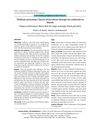 August 2024 in “Archives of Dermatological Research”
August 2024 in “Archives of Dermatological Research” Combining botulinum toxin type A with Minoxidil significantly improves hair growth and patient satisfaction in male hair loss.
 9 citations,
January 2022 in “Dermatology”
9 citations,
January 2022 in “Dermatology” People with certain skin diseases often have more trouble understanding and describing their emotions, which can affect their health and treatment results.
[object Object]  February 2024 in “Heliyon”
February 2024 in “Heliyon” People with androgenetic alopecia have different lipid levels in their blood, which vary between men and women, and may be linked to a higher risk of metabolic syndrome.
 December 2024 in “Archiv Euromedica”
December 2024 in “Archiv Euromedica” Early diagnosis and personalized treatment are crucial for managing PCOS and preventing complications.
July 2024 in “International Journal of Molecular Sciences” RF-based therapies might help treat hair loss.
 February 2024 in “Actas dermo-sifiliográficas/Actas dermo-sifiliográficas”
February 2024 in “Actas dermo-sifiliográficas/Actas dermo-sifiliográficas” Most alopecia areata patients in the study were women, aged 15-49, with patchy hair loss and often had other health conditions.
 January 2022 in “IntechOpen eBooks”
January 2022 in “IntechOpen eBooks” Some lesser-known causes of PCOS include autoimmune issues, genetic mutations, and changes in the body's microbiome.
3 citations,
April 2020 in “Medicine” Acupuncture may be a safe and cost-effective treatment for Seborrheic alopecia.
1 citations,
August 2023 in “Biomolecules” Certain immune-related proteins are higher in people with alopecia and their healthy relatives, hinting at a genetic link.
June 2020 in “Authorea (Authorea)” First-time mothers had higher stress hormone levels in late pregnancy than mothers who had given birth before.
17 citations,
November 2009 in “Dermato-endocrinology” Medium-dose prednisolone pulse therapy is effective and safe for multifocal alopecia areata but not for more severe forms.
 1 citations,
October 2022 in “Adolescent Health, Medicine and Therapeutics”
1 citations,
October 2022 in “Adolescent Health, Medicine and Therapeutics” Gender-affirming therapy can cause skin issues like acne and hair loss in transgender adolescents, and more research is needed on its dermatological effects.
[object Object]  2 citations,
December 2023 in “JEADV. Journal of the European Academy of Dermatology and Venereology/Journal of the European Academy of Dermatology and Venereology”
2 citations,
December 2023 in “JEADV. Journal of the European Academy of Dermatology and Venereology/Journal of the European Academy of Dermatology and Venereology” The document suggests a new way to categorize skin and mind disorders into two main groups to reduce confusion.
August 2024 in “International Journal of Nursing Studies Advances” Following hair transplant surgery, proper self-care is crucial for successful recovery and hair growth.
8 citations,
January 2016 in “Case Reports in Psychiatry” Trichotillomania in dementia may be better treated with dopamine blockers like quetiapine than with SSRIs.
 34 citations,
October 2007 in “International Journal of Dermatology”
34 citations,
October 2007 in “International Journal of Dermatology” The most common causes of hair loss in children in South-East Nigeria are fungal infections and alopecia areata.
 March 2011 in “Journal of clinical and experimental investigations”
March 2011 in “Journal of clinical and experimental investigations” Thallium poisoning can cause hair loss, skin rashes, and nerve damage, and can be fatal if not correctly diagnosed and treated.
 November 2003 in “Journal of Dermatology”
November 2003 in “Journal of Dermatology” Finasteride's link to depression is questionable due to study flaws and potential bias.
 218 citations,
April 2012 in “British Journal of Dermatology”
218 citations,
April 2012 in “British Journal of Dermatology” Guidelines suggest various treatments for alopecia areata, but leaving it untreated is also an option as 80% cases may recover on their own.
 April 2023 in “JOJ dermatology & cosmetics”
April 2023 in “JOJ dermatology & cosmetics” The conclusion is that a team of skin doctors and psychiatrists is needed to better treat patients with mind-skin disorders.
 56 citations,
January 2021 in “Clinical and Experimental Medicine”
56 citations,
January 2021 in “Clinical and Experimental Medicine” The document concludes that while there are various treatments for Alopecia Areata, there is no cure, and individualized treatment plans are essential due to varying effectiveness.
 9 citations,
January 2015 in “Springer eBooks”
9 citations,
January 2015 in “Springer eBooks” The document concludes that managing PCOS involves treating symptoms, regulating periods, and reducing health risks, with specific medications for fertility and metabolic issues.
 26 citations,
March 2014 in “Arquivos Brasileiros De Endocrinologia E Metabologia”
26 citations,
March 2014 in “Arquivos Brasileiros De Endocrinologia E Metabologia” The document concludes that proper diagnosis and combined treatments are key for hirsutism management, and weight loss may help overweight patients.
 May 2002 in “British Journal of Dermatology”
May 2002 in “British Journal of Dermatology” A pregnant woman's skin condition improved after giving birth, possibly due to high estrogen levels during pregnancy.
 2 citations,
March 2015 in “Expert opinion on orphan drugs”
2 citations,
March 2015 in “Expert opinion on orphan drugs” New treatments for hair loss show promise but need more research to confirm safety and effectiveness.
 1 citations,
May 2002 in “British Journal of Dermatology”
1 citations,
May 2002 in “British Journal of Dermatology” Hair loss caused by longer latent hair cycle and sudden miniaturization, not gradual follicle size reduction.
 May 2002 in “British Journal of Dermatology”
May 2002 in “British Journal of Dermatology” Hair loss caused by longer latent hair cycle and sudden miniaturization, not gradual follicle size reduction.
 4 citations,
September 2021 in “Frontiers in allergy”
4 citations,
September 2021 in “Frontiers in allergy” The conclusion is that understanding the complex relationship between allergies, autoimmunity, and psychological factors is key to treating skin disorders with itching.
 May 2017 in “Journal of the American Academy of Dermatology”
May 2017 in “Journal of the American Academy of Dermatology” Graves' disease can cause hair loss in children and should be considered when treating pediatric alopecia areata.
 15 citations,
March 2020 in “Anais Brasileiros De Dermatologia”
15 citations,
March 2020 in “Anais Brasileiros De Dermatologia” Finasteride may cause lasting sexual, mental, and physical symptoms; use with caution.






















